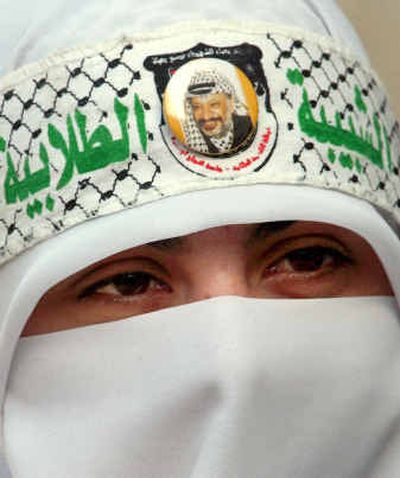Top Palestinians hold meeting without Arafat

JERUSALEM – Flanking a chair left empty by the emergency medical evacuation of Yasser Arafat, Palestinian officials convened a leadership meeting Saturday in an attempt to allay fears of a power vacuum caused by their president’s absence.
It was the first time in 35 years that Arafat had not presided over a meeting of the executive committee of the Palestine Liberation Organization, which serves as the senior decision-making body for Palestinians.
These facts alone underlined the void left by the decline of Arafat, whose incapacitation foretells an upheaval in Palestinian politics and vast uncertainty for neighboring Israelis. A Jordanian military helicopter on Friday evacuated the 75-year-old “rais” from his compound in the West Bank city of Ramallah and rushed him to a hospital near Paris.
At the Percy Army Teaching Hospital Saturday, Arafat underwent a second day of numerous medical tests, including a scan for leukemia, one of several cancers or other maladies that his symptoms suggest.
Leila Shahid, the top Palestinian official in France, said doctors have not determined what is ailing Arafat, but that the test results thus far did not show him to have leukemia.
“The doctors excluded for the time being any possibility of leukemia,” said Shahid in a brief statement. “There are many other possibilities.”
Doctors say it takes several days to produce the results of a bone marrow biopsy that can rule out leukemia.
When Arafat departed Ramallah, leaving the West Bank for the first time in nearly three years, he was suffering from an intestinal disorder and a low platelet count that prevents blood from clotting. He was said to be disoriented, extraordinarily weak, unable to recognize lifelong colleagues and had at one point lost consciousness, according to people who were with him. Doctors said the low platelets could be an indication of cancer and other life-threatening illnesses.
Shahid said French doctors would make a public statement on the Palestinian leader’s health when tests and scans are completed in coming days.
“We have nothing to hide,” she said, adding that Arafat had “a very good night’s sleep and woke up in a good mood” asking to speak to his daughter, Zahwa, who is in Tunisia. “He’s physically and psychologically better.”
In the West Bank, meanwhile, Palestinian officials were keen to broadcast an image of “business as usual,” even though it certainly wasn’t, and that Palestinian institutions, as weak as they are, continue to function. The Palestinian Legislative Council, the leadership of Arafat’s FATAH party and a national security council that oversees all Palestinian police forces will be convened today, and senior Palestinian officials planned to brief international diplomats on Monday.
“President Arafat wants us to continue normally, particularly in these difficult circumstances,” said Mahmoud Abbas, Arafat’s No. 2 inside the PLO executive committee.
Abbas has taken over running the PLO, and Palestinian Prime Minister Ahmed Qureia, known as Abu Alaa, has taken over day-to-day management of the Palestinian Authority, both at Arafat’s request, officials said. While the Palestinian Authority is the internationally recognized governing agency for the Palestinian territories, the PLO still eclipses it in real power.
Abbas, better known as Abu Mazen, urged the Palestinian public and myriad factions “to unite and work together so that there will be no pretext that may be used to harm the Palestinian people.”
At the meeting, held in the same sandbagged headquarters that Arafat departed the day before, Abbas and others symbolically left the chair at the head of the table – Arafat’s chair – empty. Abbas, as secretary-general of the committee, presided.
Palestinian officials are reluctant to make overt plays for power while Arafat is alive and are taking pains to appear respectful and act as though they expect their president to return.
The inevitable post-Arafat period is, for many people on all sides of the Middle East conflict, too scary and unpredictable to ponder. A period of violence and political chaos within Palestinian territories seems likely.
Arafat has never groomed a successor and, more important, never allowed democratic institutions inside the Palestinian entity to mature. Even before the current four-year-old intifada erupted, when government institutions and other democratic trappings were functioning relatively well, Arafat continued to micromanage and insisted on approving even minor decisions.
By law, if Arafat dies, the speaker of the Palestinian Parliament would take over formally until elections could be held. Elections in which Arafat was not a candidate would be a first, and the results would be unpredictable. Marwan Barghouti, the most popular politician after Arafat, is serving multiple life sentences in an Israeli jail.
In the guessing game over Arafat’s immediate successor, however, the most likely candidate is Abbas. Whether through election or de facto ascension. He is the most senior, well-known and respected figure among Palestinians, after Arafat, and is a political moderate. He has been at Arafat’s side through decades of the Palestinian struggle for statehood.
But he does not have a wide base of support. Arafat named him as Palestine’s first prime minister last year. He only lasted four months in the job, quitting after Arafat refused to grant him real authority.